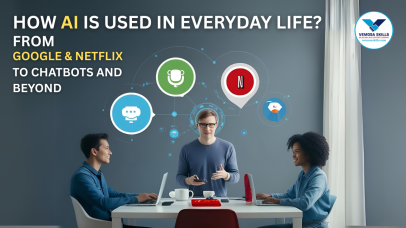AI in Agriculture in 2025: Transforming Indian Farms for a Sustainable Future
Farming in India is now changing rapidly. Where earlier farming was done in the old way, now the same work is being done with wisdom and new techniques.

Believe it or not, AI is influencing almost every online interaction you have daily to a considerable extent. Whether unlocking your phone with facial recognition or getting personalised movie recommendations, artificial intelligence is constantly working behind the scenes, which you do not even realise. Most people think that AI means Chatgpt, but Chatgpt is just a tool that works on AI. AI is something else, and it has come into your every online work today. It has fitted into our lives so that we cannot even imagine it. On one hand, AI is problematic for us; on the other hand, it is also convenient; it is making our day-to-day work very easy. But the question here is, how is AI affecting the way we work, shop, be entertained, and interact with technology?
AI in Search Engines: How Google Knows What You Need
Whenever you search anything on Google, have you noticed that it guesses your search query even before you type what you want information about? This work is being done by AI. Google uses machine learning algorithms to understand your search patterns, user behavior, and even voice searches.
How AI is Transforming Search Engines?
Autocomplete and Smart Suggestions - Google suggests search terms based on the most commonly searched terms by people and your past activity.
Voice Search Optimization – When you search anything by speaking in Google, it understands it and makes it easier for you to find the information without you having to type anything.
Featured Snippet - Whenever you search for anything, AI finds the most useful information from the available websites in the search engine and displays it at the top for your convenience.
Spam filtering - Whenever you search for something, Google's AI removes spam or low-quality content and gives you the best results.
Why it matters: AI in search engines helps users find the information they need faster and more accurately, improving the overall browsing experience.
AI in Entertainment: How Netflix and Spotify Keep You Hooked
Have you ever thought about how Netflix always suggests your favorite shows every time you open a Netflix app or watch its ads or how Spotify creates playlists that match your interests? This is also being done by AI that works behind the scenes to analyze your viewing and listening habits.
How AI Personalizes Entertainment:
Recommendation engines – Netflix, YouTube, and Spotify study what you watch and listen to and suggest similar content to you based on that.
Content Categorization - AI sorts movies, shows, and music by type, mood, and popularity to give you the best app experience.
Flexible Streaming - AI adjusts the video and sound quality to match your internet speed for smooth streaming. For example, when you choose Auto instead of a specific quality like 720p or 1080p in the video quality on YouTube, it matches your internet speed.
Why it matters: AI helps you find your favorite things faster so you can enjoy your favorite shows and music without wasting time searching for them.
AI in Virtual Assistants: Your Personal Digital Helper
Assistants like Siri, Alexa, and Google aren’t just voice-powered tools; they’re powered by natural language processing (NLP) and AI to understand and respond to your commands.
How Virtual Assistants Use AI:
Smart Home Control – AI helps you turn on lights, adjust the temperature, or play music with voice commands.
Task Automation – You can set reminders, schedule meetings, or send messages hands-free.
Personalized responses – AI learns from your behavior to provide you with customized suggestions and insights.
Why it matters: AI-powered virtual assistants save time and effort by managing daily tasks effortlessly.
AI in E-Commerce: How Online Shopping Becomes Smarter
While shopping online, have you noticed how Amazon recommends products or how chatbots assist you with your queries? AI is changing the way we shop.
AI’s Role in E-Commerce:
Personalized Product Recommendations - AI studies your browsing and purchase history to suggest relevant items.
Chatbots for Customer Support - AI-driven chatbots answer queries, resolve issues, and guide purchases.
Visual Search - Platforms like Pinterest and Google Lens allow users to search for products using images.
Fraud Detection - AI identifies unusual money transfers or payments and stops fraudulent activities.
Why it matters: AI makes online shopping more easy, personalized, and secure.
AI in Healthcare: Aiding Doctors and Patients
AI is transforming healthcare by assisting in diagnosis, treatment, and patient care.
AI Applications in Healthcare:
Medical Diagnosis - AI analyzes symptoms and medical history to suggest possible conditions.
Virtual Health Assistants - Chatbots provide medical advice and appointment reminders.
Drug Discovery - AI speeds up the development of new medicines.
Remote Monitoring - AI-powered devices track heart rate, blood pressure, and more.
Why it matters: AI improves healthcare productivity, enabling better patient care and faster medical breakthroughs.
AI in Finance: Smarter Banking and Fraud Prevention
From mobile banking apps to stock market predictions, AI is shaping the financial industry.
AI’s Role in Finance:
Fraud Detection - AI identifies unusual transactions to prevent fraud.
Automated Trading - AI analyzes market trends to make investment decisions.
Customer Support Chatbots - Banks use AI chatbots to assist customers 24/7.
Credit Scoring - AI evaluates loan eligibility based on user data.
Why it matters: AI improves financial safety, automates payments, and provides better financial insights.
AI in Smart Homes: The Future of Living
Smart homes are becoming more intelligent with AI-powered devices that improve safety, convenience, and energy effectiveness.
AI in Smart Homes:
Smart Thermostats - AI learns your temperature preferences and adjusts accordingly.
Security Systems - AI-powered cameras detect unusual activities and alert homeowners.
Voice-Controlled Devices - Control appliances using AI-powered assistants like Alexa.
Why it matters: AI makes homes smarter, safer, and more energy-efficient.
AI in Transportation: From Google Maps to Self-Driving Cars
AI is transforming transportation, from navigation apps to self-driving vehicles.
AI’s Impact on Transportation:
Google Maps & Waze - AI analyzes traffic data to provide real-time updates.
Ride-Sharing Apps - Uber and Lyft use AI to improve routes and reduce wait times.
Self-Driving Cars - AI powers self-driving vehicles for safer driving experiences.
Why it matters: AI improves travel effectiveness, reduces traffic jams, and improves road safety.
Conclusion: AI Is Here To Stay
Artificial intelligence isn't just a modern dream; it has become a part of our daily lives, making tasks easier, faster, and more efficient. From Google searches to Netflix recommendations, AI is becoming smoothly integrated into everything we do. As technology improves, AI will continue to evolve, improving our experiences in ways we can't even imagine.
Upgrade yourself in this AI era with Vemosa Skills Academy's AI-driven courses and make a successful career while studying or working. For getting complete information of the courses, click here.
Farming in India is now changing rapidly. Where earlier farming was done in the old way, now the same work is being done with wisdom and new techniques.
Nowadays, the world is changing very fast. Many new things and technologies are coming. One such technology is Artificial Intelligence (AI). AI means the ability of computers and machines to think and work like humans. This technology is now being used in every field, and education is also not untouched by it.
In the last 2-3 years, AI has changed so much that it has transformed every industry. It has completely changed the way of work. Every second, a new AI tool is coming and making some work easy and fast. The work that used to take many days or months earlier is now being done in just a few seconds, this is no less than a miracle.

Our free career counseling services are designed to help you navigate your professional journey with confidence. Our expert counselors provide personalized guidance, helping you explore career options, set goals, and develop strategies to achieve them.
Signup Now